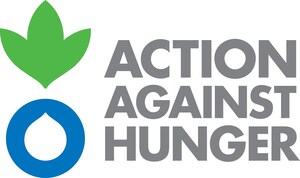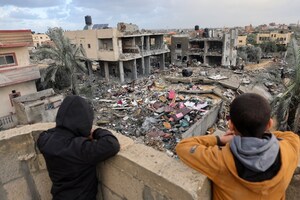NEW YORK, March 25, 2021 /PRNewswire/ -- Today marks the sixth anniversary of the war in Yemen, and the human toll is considerable: 233,000 people have died, more than half of them from indirect causes such as lack of food or healthcare. The country is now on the brink of famine. Action Against Hunger calls on the international community to fund humanitarian operations to match increasingly urgent needs, to facilitate unimpeded humanitarian access, and to protect civilians from hunger caused by the conflict.
"In Yemen, children are literally starving. Humanitarian aid has declined dramatically, and it is not reaching those who need it most. We are in a drastic situation that gets a little closer to famine each day," says Willow Rook, Deputy Country Director for Action Against Hunger in Yemen, who just returned from Al Hodeidah region, one of the hardest areas hit by this conflict.
More than 16 million Yemenis are hungry, and 400,000 children under age five are at risk of dying from severe acute malnutrition this year if they do not receive urgent treatment. The maritime blockade contributes to the crisis by preventing humanitarian aid, commercial goods, and other basic necessities from entering the country and reaching communities in need quickly.
The war in Yemen intensified in 2020, leaving more than 80% of Yemenis living below the poverty line and at least 20 million people in need of humanitarian assistance to survive. The world's worst humanitarian crisis has denied millions of people access to employment, adequate medical care, food and clean water.
Yemen's economy has experienced a further dramatic slowdown in recent months. The country is 90% dependent on imports of wheat and other basic food items, while the value of Yemeni Rial has fallen by 250% from its pre-conflict value. Even when available in the markets, food, water, and basic necessities are unaffordable for many families, who have to pay prices 140% higher than before the war.
"I owned a small fishing boat and provided for all of my family's needs by fishing and selling fish. But, as a result of the war, I was bombed by naval battleships while working at sea. I lost my boat and suffered a great psychological crisis," said one man living in Al Hodiedah region. After he lost his livelihood, he started to rely on the generosity of his relatives.
The man continued, "All the food prices have risen significantly ... They rose very frighteningly. The cost of a bag of flour was 6,000 YER (approximately $6.95 USD), and now it has become more than 11,000 YER (approximately $12.74 USD).1
International donors have contributed just 10% of the $3.85 billion needed for humanitarian operations in Yemen in 2021. Reductions in international aid due to budgetary cuts will make the humanitarian situation for Yemenis even more dire. To break the vicious cycle of conflict and hunger in Yemen, Action Against Hunger calls for new humanitarian financing from donor nations, facilitated imports of essential goods, and greater respect for international humanitarian law by the parties to the conflict.
About Action Against Hunger
Action Against Hunger, which has operated in Yemen since 2012, implements activities in some of the hardest-hit areas, including Hodeidah, Abyan, Lahj, and Taiz, where more than one in five children suffer from acute malnutrition. In these areas, Action Against Hunger provided lifesaving treatment to 41% more acutely malnourished children in the second half of 2020 compared to earlier in the year, an indication of growing needs.
1 In September, the exchange rate in southern Yemen was 844.09 YER/$1. In February, it stood at 863.72 YER/$1.
SOURCE Action Against Hunger

WANT YOUR COMPANY'S NEWS FEATURED ON PRNEWSWIRE.COM?
Newsrooms &
Influencers
Digital Media
Outlets
Journalists
Opted In






Share this article